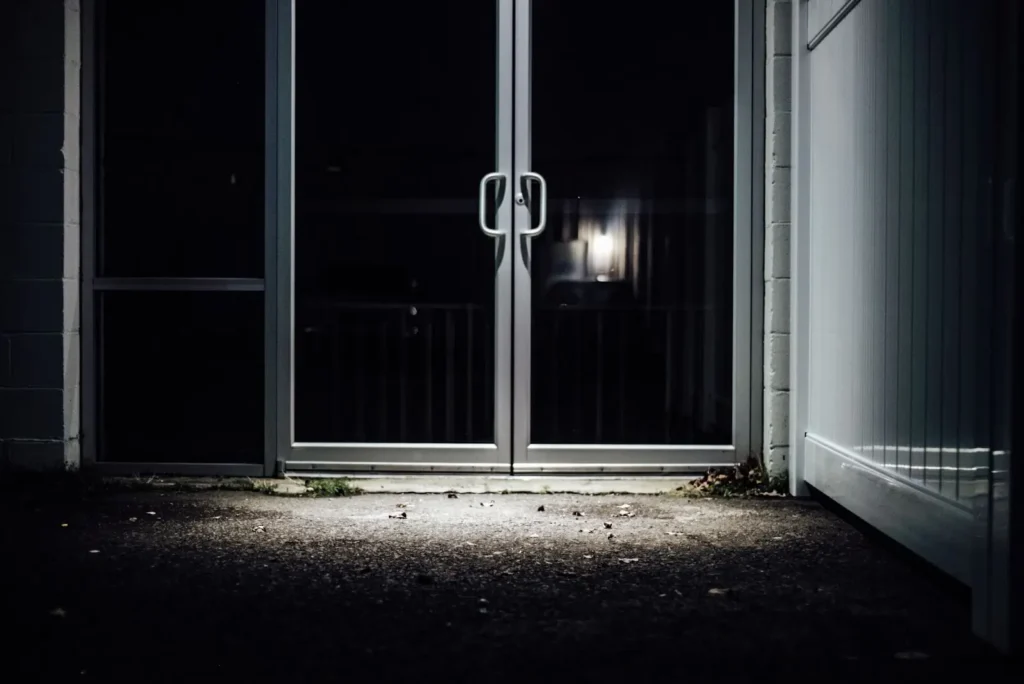Written By: Brad Campbell | January 26, 2024
In the world of security glazing, bulletproof glass is one of the products that has the most myths and misconceptions floating around it.
While it’s true that bulletproof glass windows and doors can provide a protective barrier against ballistic threats, it’s important to understand exactly what that means, including what the true capabilities and limitations of different types of bulletproof glass windows and doors are.
One of the most commonly asked questions about bulletproof glass windows and doors that we will answer below is: Can bulletproof glass be broken?
But first, let’s make sure you understand exactly how this innovative type of security glazing works, especially as applied to commercial applications.

Bulletproof glass is a specialized type of glass (or non-glass glazing) designed to withstand the impact of bullets, explosions, and other ballistic threats.
Contrary to regular commercial glass, which shatters upon impact, bulletproof glass is engineered to absorb and dissipate the kinetic energy from projectiles and impacts, including bullets and ballistic impacts.
Bulletproof glass typically consists of multiple layers, each serving a specific purpose. The outer layers are often made of strengthened security glass. Sandwiched between these outer layers are typically thermoplastic materials, such as polycarbonate, which are effective in absorbing and dispersing the force of impacts.
Although the term “bulletproof glass” is widely used, this type of glazing is more accurately referred to as bullet-resistant glass or ballistic-grade glass. This is because, as you’ll find out below, there’s no such thing as glass that’s 100% bulletproof.

One prevalent myth surrounding bulletproof glass windows and doors is that they are indestructible. While it is designed to resist bullets and withstand certain levels of force, no material is entirely impervious to ballistic impacts.
The term "bulletproof" can be very misleading, as there are different levels of bullet resistance that a window, door, or other material can have. Each of these levels means that the material is designed to withstand specific calibers and types of ammunition.
For example, a ballistic-grade commercial window or door with a UL 752 Level 1 rating is capable of stopping several rounds from a medium-powered handgun, such as a 9mm handgun. However, shooting the glass repeatedly in the same place or using something like a high-powered rifle will penetrate it.
Another common misconception is that installing bulletproof glass means you have unbreakable windows and doors.
Bulletproof glass is engineered to prevent shattering upon impact, but it can still crack, spall, or break under extreme pressure or during sustained attacks. The goal of bullet-resistant security glazing is to provide a certain level of protection, not absolute invulnerability.
Of course, whether or not bulletproof glass windows and doors can be broken depends heavily on what its exact composition is.
There are certain materials used for bulletproof commercial doors and windows that, even if riddled with bullets and penetrated, won’t crack or significantly diminish in strength. For instance, polycarbonate and glass-clad polycarbonate doors and windows are virtually unbreakable.
Not all bulletproof glass is created equal or intended for the same applications. Different situations require different levels of ballistic protection, and there are various standards that define the bullet resistance of bulletproof glass and what it should be used for.
The level of ballistic protection needed depends on factors such as the type of threat, the caliber of the bullets that the glazing could potentially face, and the intended application.
For instance, a commercial glass door with UL 752 Level 1-rated ballistic-grade polycarbonate glazing can result in a virtually unbreakable entryway door system that will deny forced entry and stop several rounds from 9mm handguns, but won’t withstand ballistic impacts from more high-powered firearms, like an AK-47 rifle.
If a higher level of ballistic protection is the primary goal, a facility could benefit from retrofitting doors and windows with a thicker, stronger type of bullet-resistant glazing, such as glass-clad polycarbonate with a UL 752 Level 7 rating.
The exact type of bullet-resistant glazing needed will vary greatly depending on the type of application and how high-security the commercial building or facility is. A professional threat assessment can help determine the right level of bullet-resistance and what type of security glazing products to use.

The ability to break bulletproof glass depends significantly on the caliber and type of ammunition used in an attack. Higher-caliber bullets with greater kinetic energy pose a more significant challenge to bullet-resistant glass.
While some bulletproof glass windows and doors may withstand smaller-caliber bullets, larger and more powerful ammunition may penetrate or cause damage.
Beyond the type of firearm and ammunition used, the duration of an attack also factors heavily into whether or not bulletproof glass breaks. The longer and more determined an attack is, the more likely penetration or breakage is.
While bulletproof glass windows and doors are effective against certain ballistic threats, it may have limitations against other forms of attack.
For example, sustained attacks using different methods, extreme temperatures, or specialized tools could compromise the integrity of bulletproof glass.
Understanding these limitations is crucial for proper security planning, especially if forced entry prevention is your primary goal.
In the quest for enhanced commercial security, ballistic-grade security glazing is a powerful companion with the potential to protect against forced entry, active threats, and more.
While bullet-resistant glass windows and doors offer a high level of protection against many ballistic threats, it’s important to understand that there’s no such thing as fully bulletproof glass, and that it can still be penetrated and otherwise damaged in certain scenarios.
It’s crucial for individuals and organizations to have a realistic understanding of the capabilities and limitations of bulletproof glass in order to implement it effectively as part of hardening any facility's doors and windows against threats.

Riot Glass, LLC provides a full range of forced entry- and bullet-resistant security glazing for commercial doors and windows. Our solutions are ideal for everything from schools to the most high-security properties, such as government buildings.
Contact our team of security glazing experts today for a free consultation.

HOW CAN WE HELP YOU?
